- Home
- Ken Follett
The Hammer of Eden Page 6
The Hammer of Eden Read online
Page 6
"Handsome devil," Star said--laughing at him, but in a nice way, affectionate.
"Smart, too," Priest said.
"I guess you are. You got us this machine, anyway."
Priest nodded. "And you ain't seen nothing yet."
2
In the Federal Building at 450 Golden Gate Avenue in San Francisco, early on Monday morning, FBI agent Judy Maddox sat in a courtroom on the fifteenth floor, waiting.
The court was furnished in blond wood. New courtrooms always were. They generally had no windows, so the architects tried to make them brighter by using light colors. That was her theory. She spent a lot of time waiting in courtrooms. Most law enforcement personnel did.
She was worried. In court she was often worried. Months of work, sometimes years, went into preparing a case, but there was no telling how it would go once it got to court. The defense might be inspired or incompetent, the judge a sharp-eyed sage or a senile old fool, the jury a group of intelligent, responsible citizens or a bunch of lowlife jerks who ought to be behind bars themselves.
Four men were on trial today: John Parton, Ernest "Taxman" Dias, Foong Lee, and Foong Ho. The Foong brothers were the big-time crooks, the other two their executives. In cooperation with a Hong Kong triad, they had set up a network for laundering money from the Northern California dope industry. It had taken Judy a year to figure out how they were doing it and another year to prove it.
She had one big advantage when going after Asian crooks: she looked Oriental. Her father was a green-eyed Irishman, but she took more after her late mother, who had been Vietnamese. Judy was slender and dark haired, with an upward slant to her eyes. The middle-aged Chinese gangsters she had been investigating had never suspected that this pretty little half-Asian girl was a hotshot FBI agent.
She was working with an assistant U.S. attorney whom she knew unusually well. His name was Don Riley, and until a year ago they had been living together. He was her age, thirty-six, and he was experienced, energetic, and as smart as a whip.
She had thought they had a watertight case. But the accused men had hired the top criminal law firm in the city and put together a clever, vigorous defense. Their lawyers had undermined the credibility of witnesses who were, inevitably, from the criminal milieu themselves; and they had exploited the documentary evidence amassed by Judy to confuse and bewilder the jury.
Now neither Judy nor Don could guess which way it would go.
Judy had a special reason to be worried about this case. Her immediate boss, the supervisor of the Asian Organized Crime squad, was about to retire, and she had applied for the job. The overall head of the San Francisco office, the special agent in charge, or SAC, would support her application, she knew. But she had a rival: Marvin Hayes, another high-flying agent in her age group. And Marvin also had powerful support: his best friend was the assistant special agent in charge responsible for all the organized crime and white-collar crime squads.
Promotions were granted by a career board, but the opinions of the SAC and ASACs carried a lot of weight. Right now the contest between Judy and Marvin Hayes was close.
She wanted that job. She wanted to rise far and fast in the FBI. She was a good agent, she would be an outstanding supervisor, and one of these days she would be the best SAC the bureau had ever had. She was proud of the FBI, but she knew she could make it better: with faster introduction of new techniques like profiling through the use of streamlined management systems and--most of all--by getting rid of agents like Marvin Hayes.
Hayes was the old-fashioned type of law enforcement officer: lazy, brutal, and unscrupulous. He had not put as many bad guys in jail as Judy, but he had made more high-profile arrests. He was good at insinuating himself into a glamorous investigation and quick to distance himself from a case that was going south.
The SAC had hinted to Judy that she would get the job, rather than Marvin, if she won her case today.
In court with Judy were most of the team on the Foong case: her supervisor, the other agents who had worked with her, a linguist, the squad secretary, and two San Francisco Police Department detectives. To her surprise, neither the ASAC nor the SAC was there. This was a big case, and the result was important to both of them. She felt a twinge of unease. She wondered if something was going on at the office that she did not know about. She decided to step outside and call. But before she got to the door, the clerk of the court entered and announced that the jury was about to return. She sat down again.
A moment later Don came back in, smelling of cigarettes: he had started smoking again since they split. He gave her shoulder an encouraging squeeze. She smiled at him. He looked nice, with his neat short haircut, dark blue suit, white button-down shirt, and dark red Armani tie. But there was no chemistry, no zing: she no longer wanted to muss his hair and undo his tie and slide her hand inside the white shirt.
The defense lawyers returned, the accused men were walked into the dock, the jury entered, and at last the judge emerged from his chambers and took his seat.
Judy crossed her fingers under the table.
The clerk stood up. "Members of the jury, have you reached a verdict?"
Absolute silence descended. Judy realized she was tapping her foot. She stopped.
The foreman, a Chinese shopkeeper, stood up. Judy had spent many hours wondering whether he would sympathize with the accused, because two of them were Chinese, or hate them for dishonoring the race. In a quiet voice he said: "We have."
"And how do you find the accused--guilty or not guilty?"
"Guilty as charged."
There was a second of silence as the news sank in. Behind her, Judy heard a groan from the dock. She resisted the impulse to whoop with joy. She looked at Don, who was smiling broadly at her. The expensive defense lawyers shuffled papers and avoided each other's eyes. Two reporters got up and left hastily, heading for the phones.
The judge, a thin, sour-faced man of around fifty, thanked the jury and adjourned the case for sentencing in a week's time.
I did it, Judy thought. I won the case, I put the bad guys in jail, and my promotion is in the bag. Supervising Special Agent Judy Maddox, only thirty-six, a rising star.
"All stand," the clerk said.
The judge went out.
Don hugged Judy.
"You did a great job," she told him. "Thanks."
"You gave me a great case," he said.
She could tell he wanted to kiss her, so she stepped back a pace. "Well, we both did good," she said.
She turned to her colleagues and went around them all, shaking hands and hugging and thanking them for their work. Then the defense lawyers came over. The senior of the two was David Fielding, a partner in the firm of Brooks Fielding. He was a distinguished-looking man of about sixty. "Congratulations, Ms. Maddox, on a well-deserved win," he said.
"Thank you," she said. "It was closer than I expected. I thought I had it buttoned up until you got started."
He acknowledged the compliment with a tilt of his well-groomed head. "Your preparation was immaculate. Were you trained as a lawyer?"
"I went to Stanford Law School."
"I thought you must have a law degree. Well, if you ever get tired of the FBI, please come and see me. With my firm you could be earning three times your present salary in less than a year."
She was flattered, but she also felt condescended to, so her reply was sharp. "That's a nice offer, but I want to put bad guys in jail, not keep them out."
"I admire your idealism," he said smoothly, and turned to speak to Don.
Judy realized she had been waspish. It was a fault of hers, she knew. But what the hell, she did not want a job with Brooks Fielding.
She picked up her briefcase. She was eager to share her victory with the SAC. The San Francisco field office of the FBI was in the same building as the court, on two lower floors. As she turned to leave, Don grabbed her arm. "Have dinner with me?" he said. "We ought to celebrate."
She did not have a date. "
Sure."
"I'll make a reservation and call you."
As she left the room, she remembered the feeling she had had earlier, that he wanted to kiss her; and she wished she had invented an excuse.
As she entered the lobby of the FBI office she wondered again why the SAC and the ASAC had not come to court for the verdict. There was no sign of unusual activity here. The carpeted corridors were quiet. The robot mailman, a motorized cart, hummed from door to door on its predetermined route. For a law enforcement agency, they had fancy premises. The difference between the FBI and a police precinct house was like the difference between corporate headquarters and the factory floor.
She headed for the SAC's office. Milton Lestrange had always had a soft spot for her. He had been an early supporter of women agents, who now numbered ten percent of agents. Some SACs barked orders like army generals, but Milt was always calm and courteous.
As soon as she entered his outer office she knew something was wrong. His secretary had obviously been crying. Judy said: "Linda, are you okay?" The secretary, a middle-aged woman who was normally coldly efficient, burst into tears. Judy went to comfort her, but Linda waved her away and pointed to the door of the inner office.
Judy went in.
It was a large room, expensively furnished, with a big desk and a polished conference table. Sitting behind Lestrange's desk, with his jacket off and his tie loosened, was ASAC Brian Kincaid, a big, barrel-chested man with thick white hair. He looked up and said: "Come in, Judy."
"What the hell is going on?" she said. "Where's Milt?"
"I have bad news," he said, though he did not look too sad. "Milt is in the hospital. He's been diagnosed with pancreatic cancer."
"Oh, my God." Judy sat down.
Lestrange had gone to the hospital yesterday--for a routine checkup, he had said, but he must have known there was something wrong.
Kincaid went on: "He'll be having an operation, some kind of intestinal bypass, and he won't be back here for a while, at best."
"Poor Milt!" Judy was shocked. He had seemed like a man at his peak: fit, vigorous, a good boss. Now he had been diagnosed with a deadly illness. She wanted to do something to comfort him, but she felt helpless. "I guess Jessica's with him," she said. Jessica was Milt's second wife.
"Yes, and his brother's flying up from Los Angeles today. Here in the office--"
"What about his first wife?"
Kincaid looked irritated. "I don't know about her. I talked to Jessica."
"Someone should tell her. I'll see if I can get a number for her."
"Whatever." Kincaid was impatient to get off the personal stuff and talk about work. "Here in the office, there are some changes, inevitably. I've been made acting SAC in Milt's absence."
Judy's heart sank. "Congratulations," she said, trying for a neutral tone.
"I'm moving you to the Domestic Terrorism desk."
At first Judy was just puzzled. "What for?"
"I think you'll do well there." He picked up the phone and spoke to Linda. "Ask Matt Peters to come in and see me right away." Peters was supervisor of the DT squad.
"But I just won my case," Judy said indignantly. "I put the Foong brothers in jail today!"
"Well done. That doesn't change my decision."
"Wait a minute. You know I've applied for the job of supervisor in the Asian Organized Crime squad. If I get moved off the squad now, it's going to look like I had some kind of problem."
"I think you need to broaden your experience."
"And I think you want Marvin to get the Asian desk."
"You're right. I believe Marvin is the best person for that job."
What a jerk, Judy thought furiously. He gets made boss and the first thing he does is use his new power to promote a buddy. "You can't do this," she said. "We have Equal Employment Opportunity rules."
"Go ahead, make a complaint," Kincaid said. "Marvin is better qualified than you."
"I've put a hell of a lot more bad guys in jail."
Kincaid gave her a complacent smile and played his trump card. "But he's spent two years at headquarters in Washington."
He was right, Judy thought despairingly. She had never worked at FBI headquarters. And although it was not an absolute requirement, headquarters experience was thought desirable in a supervisor. So there was no point in her making an Equal Employment Opportunity complaint. Everyone knew she was the better agent, but Marvin looked better on paper.
Judy fought back tears. She had worked her socks off for two years and scored a major victory against organized crime, and now she was being cheated of her reward by this creep.
Matt Peters came in. He was a stocky guy of about forty-five, bald, wearing a short-sleeved shirt and a tie. Like Marvin Hayes, he was close to Kincaid. Judy began to feel surrounded.
"Congratulations on winning your case," Peters said to Judy. "I'll be glad to have you on my squad."
"Thank you." Judy could not think what else to say.
Kincaid said: "Matt has a new assignment for you."
Peters had a file under his arm, and now he handed it to Judy. "The governor has received a terrorist threat from a group calling itself the Hammer of Eden."
Judy opened the file, but she could hardly make out the words. She was shaking with anger and an overwhelming sense of futility. To cover her emotions she tried to talk about the case. "What are they demanding?"
"A freeze on the building of new power plants in California."
"Nuclear plants?"
"Any kind. They gave us four weeks to comply. They say they're the radical offshoot of the Green California Campaign."
Judy tried to concentrate. Green California was a legitimate environmental pressure group based in San Francisco. It was hard to believe they would do something like this. But all such organizations were capable of attracting nutcases. "And what's the threat?"
"An earthquake."
She looked up from the file. "You're putting me on."
Matt shook his bald head.
Because she was angry and upset, she did not bother to sweeten her words. "This is stupid," she said bluntly. "No one can cause an earthquake. They might as well threaten us with three feet of snow."
He shrugged. "Check it out."
Judy knew that high-profile politicians received threats every day. Messages from crazies were not investigated by the FBI unless there was something special about them. "How was this threat communicated?"
"It appeared on an Internet bulletin board on the first of May. It's all in the file."
She looked him in the eye. She was in no mood to take any crap. "There's something you're not telling me. This threat has no credibility whatsoever." She looked at her watch. "Today is the twenty-fifth. We've ignored the message for three and a half weeks. Now, suddenly, with four days left to the deadline, we're worried?"
"John Truth saw the bulletin board--surfing the Net, I guess. Maybe he was desperate for a hot new topic. Anyway, he talked about the threat on his show Friday night, and he got a lot of calls."
"I get it." John Truth was a controversial talk radio host. His show came out of San Francisco, but it was syndicated live on stations all over California. Judy became even angrier. "John Truth pressured the governor to do something about the terrorist message. The governor responded by calling in the FBI to investigate. So we have to go through the motions of an investigation that no one really believes in."
"That's about it."
Judy took a deep breath. She addressed Kincaid, not Peters, because she knew this was his doing. "This office has been trying to nail the Foong brothers for twenty years. Today I put them in jail." She raised her voice. "And now you give me a bullshit case like this?"
Kincaid looked pleased with himself. "If you want to be in the Bureau, you'll have to learn to take the rough with the smooth."
"I learned, Brian!"
"Don't yell."
"I learned," she repeated in a lower voice. "Ten years ago, when I was new and in
experienced and my supervisor didn't know how far he could rely on me, I was given assignments like this--and I took them cheerfully, and did them conscientiously, and proved that I goddamn well deserve to be trusted with real work!"
"Ten years is nothing," Kincaid said. "I've been here twenty-five."
She tried reasoning with him. "Look, you've just been put in charge of this office. Your first act is to give one of your best agents a job that should have gone to a rookie. Everyone will know what you've done. People will think you've got some kind of grudge."
"You're right, I just got this job. And you're already telling me how to do it. Get back to work, Maddox."
She stared at him. Surely he would not just dismiss her.
He said: "This meeting is over."
Judy could not take it. Her rage boiled over.
"It's not just this meeting that's over," she said. She stood up. "Fuck you, Kincaid."
A look of astonishment came over his face.
Judy said: "I quit."
And then she walked out.
*
"You said that?" Judy's father said.
"Yeah. I knew you'd disapprove."
"You were right about that, anyway."
They were sitting in the kitchen, drinking green tea. Judy's father was a detective with the San Francisco police. He did a lot of undercover work. He was a powerfully built man, very fit for his age, with bright green eyes and gray hair in a ponytail.
He was close to retirement and dreading it. Law enforcement was his life. He wished he could remain a cop until he was seventy. He was horrified by the idea of his daughter quitting when she did not have to.
Judy's parents had met in Saigon. Her father was with the army in the days when American troops there were still called "advisers." Her mother came from a middle-class Vietnamese family: Judy's grandfather had been an accountant with the Finance Ministry there. Judy's father brought his bride home, and Judy was born in San Francisco. As a baby she called her parents Bo and Me, the Vietnamese equivalent of Daddy and Mommy. The cops caught on to this, and her father became known as Bo Maddox.

 The Pillars of the Earth
The Pillars of the Earth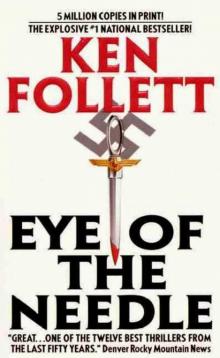 Eye Of The Needle
Eye Of The Needle Lie Down With Lions
Lie Down With Lions Winter of the World
Winter of the World Triple
Triple World Without End
World Without End Fall of Giants
Fall of Giants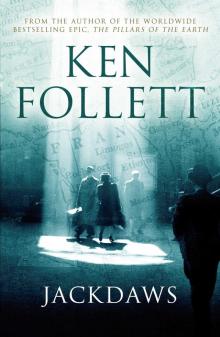 Jackdaws
Jackdaws Hornet Flight
Hornet Flight Whiteout
Whiteout A Dangerous Fortune
A Dangerous Fortune The Man From St. Petersburg
The Man From St. Petersburg A Column of Fire
A Column of Fire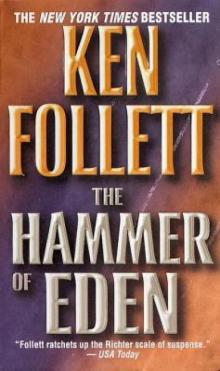 The Hammer of Eden
The Hammer of Eden On Wings of Eagles
On Wings of Eagles The Evening and the Morning
The Evening and the Morning The Key to Rebecca
The Key to Rebecca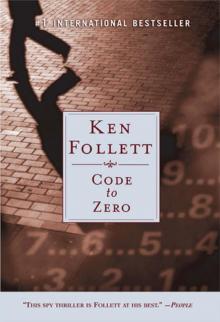 Code to Zero
Code to Zero Paper Money
Paper Money A Place Called Freedom
A Place Called Freedom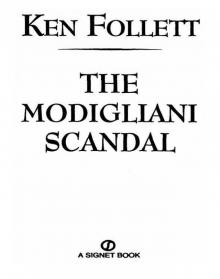 The Modigliani Scandal
The Modigliani Scandal Triple (1991)
Triple (1991) A Dangerous Fortune (1994)
A Dangerous Fortune (1994) A Place Called Freedom (1995)
A Place Called Freedom (1995) Winter of the World (Century Trilogy 2)
Winter of the World (Century Trilogy 2)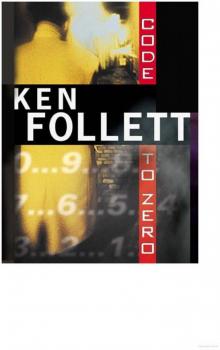 Code to Zero (2000)
Code to Zero (2000) On Wings Of Eagles (1990)
On Wings Of Eagles (1990) Storm Island
Storm Island Fall of Giants (The Century Trilogy)
Fall of Giants (The Century Trilogy)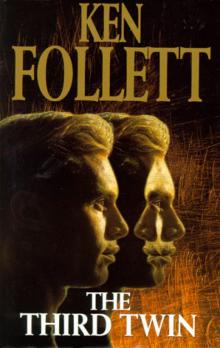 the Third Twin (1996)
the Third Twin (1996)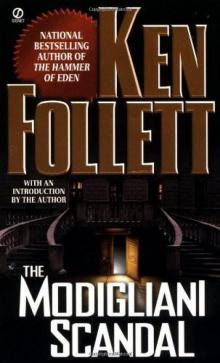 The Modigliani Scandal (1976)
The Modigliani Scandal (1976) Night Over Water
Night Over Water